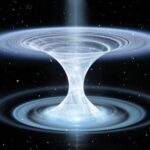A white hole is a strange cosmic entity that glows brightly and emits stuff rather than disappearing. To put it another way, it’s the polar opposite of a black hole. Unlike black holes, however, there is no agreement on whether white holes exist or how they develop.
Einstein’s theory of gravity predicts them, and they’re most commonly cited in the context of wormholes, in which a black hole serves as the entrance point to a tunnel through space and time that leads to a white hole somewhere else in the Universe. However, because Einstein’s theory predicts the existence of a so-called singularity at the center of black holes – a state of infinite gravity that prevents anything from passing through to the white hole on the other side – this is highly contentious.
Some theorists, however, believe that combining Einstein’s theory with quantum theory leads to a new way of thinking about white holes. They could be a slow-motion replay of the development of the initial black hole, rather than the ‘exit’ through a wormhole.

